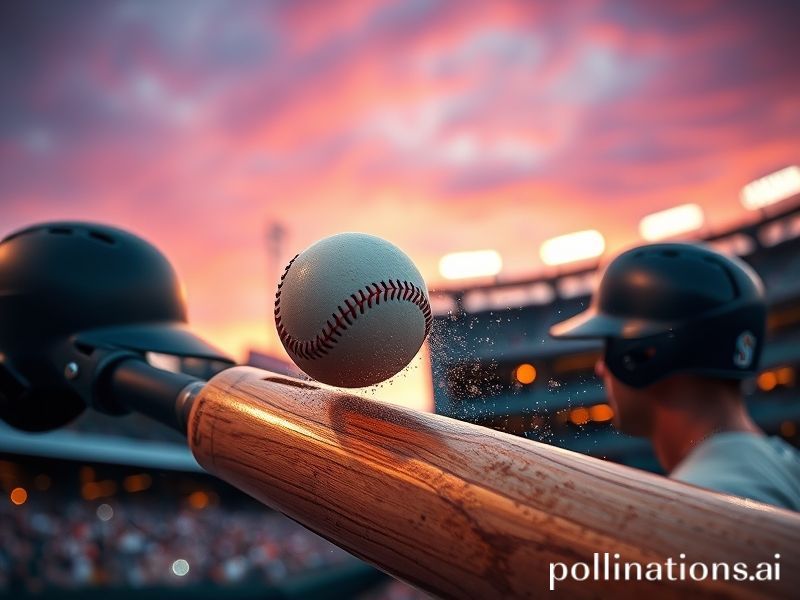Nationals vs Marlins: How a Meaningless Baseball Game Explains the Entire Global Economy
The Washington Nationals and the Miami Marlins, two baseball franchises whose combined payrolls could bail out a modestly failing European bank, faced off last night in a contest that the global community greeted with the same polite indifference normally reserved for a UN subcommittee on agricultural tariffs. From the Maracanã to the Marina Bay Sands, screens flickered with Champions League highlights, K-League drama, and the eternal Bollywood loop that keeps a billion Indians from rioting over onion prices. Somewhere in that planetary mosaic, nine men in red and nine in teal tried to remember why grown-ups still chase a stitched sphere for money that would make a Swiss cantonal banker blush.
To the uninitiated observer in Ouagadougou—where electricity is rationed like vintage Bordeaux—this looked suspiciously like the same late-capitalist ritual performed nightly across the American hemisphere: millionaires under lights, fans mortgaging dignity for the illusion of tribal belonging, and a scoreboard ticking toward statistical meaninglessness. Yet there is geopolitical poetry here, if one squints through the smog of existential dread. The Nationals, property of a conglomerate whose other hobbies include lobbying against climate legislation, versus the Marlins, plaything of a former art dealer who once flipped Basquiats the way other oligarchs flip parliaments. Somewhere between the mound and the mortgage crisis, baseball becomes a morality play for our neoliberal twilight.
Consider the pitching matchup: a 25-year-old Dominican fireballer whose signing bonus exceeds the GDP of his hometown, dueling a 32-year-old journeyman lefty already eyeing a post-retirement condo in Scottsdale where the water table is dropping faster than his ERA. The Dominican’s fastball, clocked at 99 mph, travels faster than most World Food Programme convoys; the lefty’s curveball breaks with the same cruel inevitability as emerging-market currencies when the Fed whispers “rate hike.” Each pitch, then, is a referendum on whether athletic grace can still distract from structural collapse—spoiler alert, it can, at least until the seventh-inning stretch.
In the stands, the human condition performs its usual tragicomedy: hedge-fund interns calculating the arbitrage potential of bobblehead futures; Cuban-American grandfathers muttering about Castro while nursing $14 beers; TikTok influencers live-streaming existential despair for followers in Jakarta who dream of any America, even this one. The stadium’s Jumbotron flashes military recruitment ads between innings, a reminder that if these kids don’t make the majors, Kandahar remains a viable fallback. Dark humor, yes, but no darker than the moment when the public-address system asks everyone to honor veterans while the concession stands continue charging veterans $9 for nachos.
Overseas, the game’s ripple effects are felt in ways that would baffle the average bleacher creature. In Tokyo, a data-analytics firm adjusts its proprietary model on American swing mechanics, selling the insights to a South Korean tech giant that will use them to optimize drone-delivered kimchi. In Caracas, a barrio kid streams the game on a cracked Huawei, wondering if the $5 million arbitration settlement just flashed onscreen could vaccinate half his neighborhood. Even the European Union, fresh from sanctioning another Russian oligarch, takes note: the Marlins’ majority owner once tried to buy a Serie A club, proof that sports laundering is the only growth industry with a worse carbon footprint than Bitcoin.
By the twelfth inning—because nothing says “athletic peak” like two teams too stubborn to admit mutual mediocrity—the score remains knotted in a cosmic shrug. The few remaining spectators resemble survivors of a particularly tedious UN climate summit: exhausted, under-caffeinated, and dimly aware the planet is still doomed. When the Marlins finally push across a run on a fielder’s choice that looked suspiciously like an existential metaphor, fireworks erupt as if the International Monetary Fund had just forgiven student debt. The Nationals trudge off, another loss closer to mathematical elimination, which in baseball parlance translates to “rebuilding,” which in human parlance translates to “same circus, cheaper monkeys.”
And so the world spins: stock exchanges yawn, glaciers calve, and somewhere a Dominican teenager signs for a bonus that could fund a rural hospital. The game ends, the lights dim, and the stadium empties into a parking lot where Teslas idle beside Hondas whose owners pray the alternator lasts another season. International significance? Perhaps not. But as the last fan shuffles out, humming a half-remembered jingle from a crypto exchange ad, one truth remains: empires collapse, currencies devalue, but baseball—absurd, mercenary, and hopelessly beautiful—will still be here tomorrow, selling peanuts and micro-doses of meaning to anyone willing to overpay for both.







